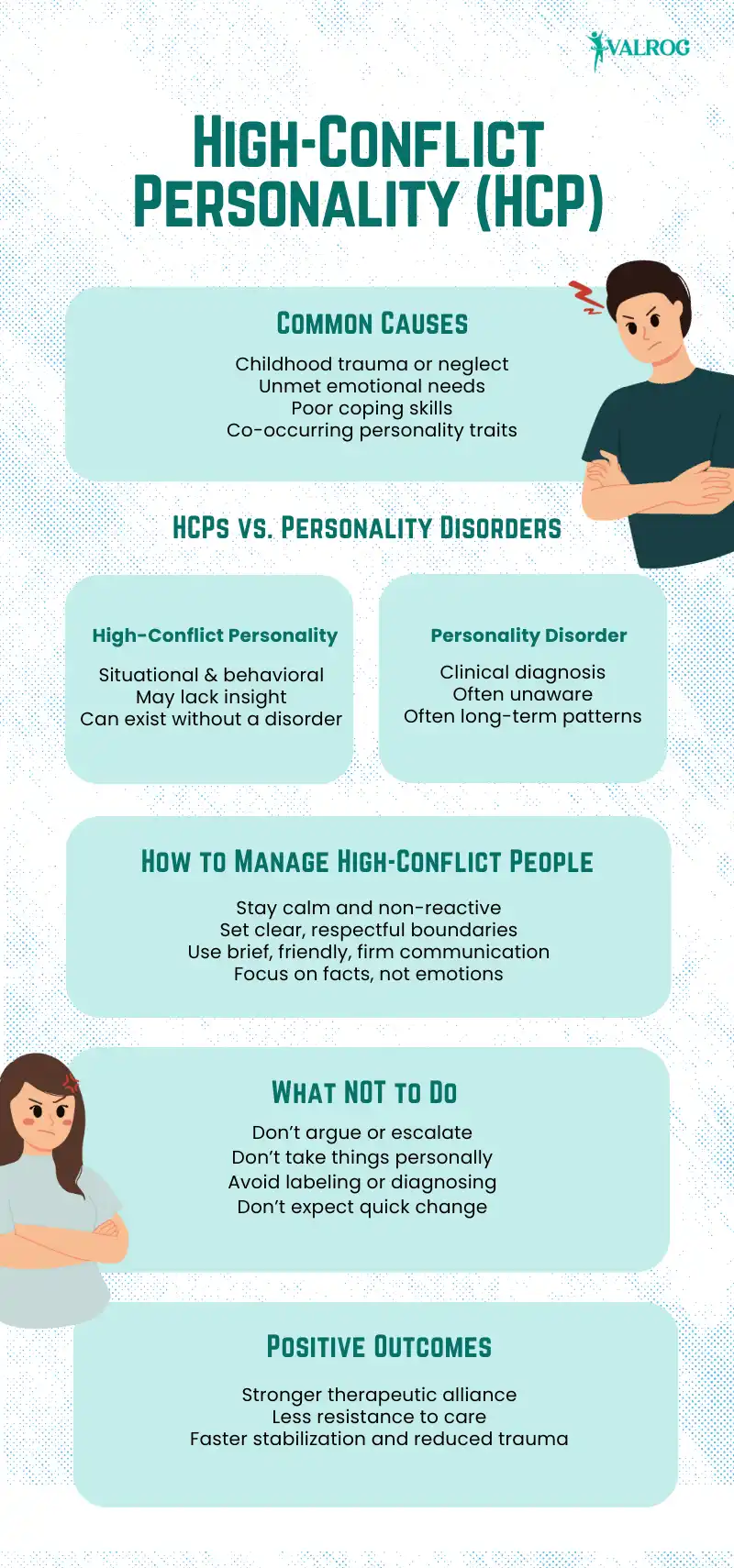Every person’s personality is made of their behaviour, emotional responses, and thought patterns. Due to the varying personalities of individuals and their interrelated conflicts is inevitable. But some individuals may be involved in more conflict situations than others.
Now at some point in your life, you must have found yourself trapped in an endless cycle of conflict with a person. Which led you to wonder, “Why does this person always blame others? and never takes responsibility?”
In psychology, this is categorised as high-conflict behaviour. Where a person is involved in conflict when they start to lose control. High conflict behaviour often leads to people being difficult to deal with.
This high-conflict personality is not inherent in anyone. It is a learned behaviour or a strategy developed over time. It can also result from an underlying mental health condition.
Today, we will go through the personality traits of a high-conflict person. We also discuss the causes and how to deal with a high-conflict person.
What Is a High-Conflict Personality?
Personality disorders are classified as clusters A, B, and C, and high-conflict personality. While a High-conflict personality falls under the B category. This category of people is often seen as emotional and changeable. In these categories, personalities such as borderline, antisocial, narcissistic, and histrionic. There is a little distinction between high-conflict personality and high-conflict personality disorder. Let’s define the terms first:
High Conflict Personality (HCP): a set of behaviors that involve angry emotional outbursts, habitual blame-shifting, and an inclination to turn disagreements into major conflicts. These people find it difficult to take responsibility and always shift the blame.
High Conflict Personality Disorder: extreme and persistent patterns affecting relationships and functioning.
These people are also termed as conflict personality, contentious personality, or conflictual person. Now, a person with HCP might not always have these personality disorders. But they can have some similarities, i.e. a person having antagonistic behaviours.

Visit: Acetaminophen vs Ibuprofen: Which One Should You Choose?
Key Traits of High-Conflict Individuals
High-conflict people usually act in predictable and destructive manners in relationships.
Chronic blame-shifting is one of the most patterned behaviors of high-conflict people. Accusation and blame-shifting are more often a protection or defense measure against negative feelings. Such as feeling of shame, weakness, or a means of refusing to take responsibility. Instead of seeking introspection, high-conflict people attack outward and create division.
The emotional reactions are usually violent and exaggerated. A delay in responding to a message or a casual remark becomes either a betrayal or an insult. The inability to control emotions is often the basis of these reactions.
Minor differences between individuals that can be resolved with conversation are exaggerated. This is more so when the individual perceives an indifferent action as an attack on him or her.
High-conflict people are inclined to think in extremes. They only see people as either all good or all bad. They lack the subtlety with which most of us would assess relationships. This type of thinking leaves little room to compromise and creates anger-resentment cycles.
They can be incapable or reluctant to empathize with the impact of their actions on others. And they are sensitive to felt insults. A mild reprimand is labeled as a fierce assault. This hypersensitivity might result in defensiveness, aggression, or total shutdown.
Real-life scenarios, let us consider a few. The high-conflict Person can turn aggressive on receiving feedback. They can start accusations of sabotage against co-workers at work. They can also make life miserable for a team with constant complaints. They can show anger in a romantic or family relationship and become emotionally tiring. They can also aggravate the situation in court. Or during custody disagreements or neighborhood conflicts. Using accusations, suing or manipulation causes resolution to be much harder.

Discover: Can I Commit Myself to a Mental Hospital? Signs You Shouldn’t Ignore
What Causes High-Conflict Personality Disorder?
HCP traits are often related to factors including biology, environment, and culture.
Biologically, genetics can make a person more susceptible to being impulsive and reactive. These characteristics are a result of their inborn characteristics. Disruption in neurochemicals can influence a person’s manner in which they manage emotions. This may result in dramatic responses observed among high-conflict individuals.
Psychosocial factors are also important. A lot of high-conflict individuals have traumatic, neglectful, or disorganized childhood histories. For instance, if a person grew up in an atmosphere where they were shouted at, manipulated, or punished. He/she might use those strategies as a means of survival. They might carry their influence into adult life. Another environmental factor can be Insecure attachment. Children with this attachment style in early childhood relationships with caregivers often harbour a permanent fear of abandonment and unbalanced emotional attachment.
Other individuals learnt these behaviors by observation. When a person grows up around models of conflict resolution (either in real life or on television). Such as those who resort to aggression, placing the blame, or becoming emotionally volatile. They carry these behavioural characteristics into their personality and consider them a standard.
Culture also plays an important role. For instance, when the context is very competitive or the media culture rewards anger and domination. In such situations then high-conflict behavior may be rewarded instead of being punished. For instance, reality TV shows that Fournier claims favor drama. Or how social media has created a situation in which it is better to blame than to seek understanding.
Other mental disorders tend to co-occur with HCP characteristics. Usually, a person experiencing HCP also exhibits traits of other personality disorders. Including Borderline Personality Disorder, Narcissistic Personality Disorder, Paranoid Personality Disorder, or even PTSD. Such an overlap complicates treatment and recognition. But it also provides possible avenues of support.

Explore: Is Stainless Steel Non Toxic? Full Comparison with Cast Iron
High Conflict Personalities vs. Personality Disorders
HCP involves similar traits of other personality disorders.
Narcissistic HCPs may always put others down and want admiration. Borderline HCPs can also retaliate in response to actual or perceived abandonment. The paranoid individuals may think that other people are out to get them. This is a primary symptom of the Paranoid Personality Disorder. Antisocial HCPs are also likely to be manipulative and even violent. And histrionic HCPs can also be exaggerating or even lying to stay in the spotlight-characteristics.
Not all high-conflict people exhibit a clinical personality disorder. Yet the behavioral patterns they show may be disruptive.
How to Manage High-Conflict People
Now, a rational question must be coming to your mind that “How do you even resolve the conflict with a person who enjoys conflict?”. It is not simple to have relationships with high-conflict people. Yet, it is possible with appropriate tactics.
Strong yet respectful boundaries should help in personal relationships. You must be clear on what you consider to be acceptable and create boundaries. Direct communication without any emotional appeal or argumentation will do better. It is not necessary to change them; take care of your own emotional space. It can also be so helpful to find your therapy or support.
Documentation is your best friend in the workplace. Document communications, particularly with an individual who has a bent toward distorting reality. It is easy to get sucked into emotional arguments, so resist this tendency and shift back to tasks and goals. Use mediation of HR or supervisors, as needed.
High-conflict individuals need to be intervened in a structured way. Whether in a legal or therapeutic context. Mediation could be a useful alternative to court, especially in custody or divorce cases. But there are no alternatives to litigation in certain situations. Involving mental health professionals can also prove helpful, providing a clear future direction.
Learn More: Medication for Anger Issues: Types, Benefits & When to Consider Them
What NOT to Do with High-Conflict Individuals
There are also a few things you should avoid doing, no matter how tempted you might be.
Do not meet their intensity. Any angry or emotional reaction will aggravate the situation. Do not think you can mold them. Most high-conflict people are not easy to change, especially without encouragement. Although it is no good to disregard the way they feel. It is important not to encourage distortions or enable toxicity. The aim would be to keep empathy without losing your boundaries.

Protect yourself from a high-conflict person!
It is exhausting, disorienting, and even intimidating to interact with a high-conflict individual. In some cases, having a strategy and seeking professional help can help. And you can save your well-being. With a high-conflict individual, you are not forced to feel powerless. Regardless of your relationship with a conflictive individual.
Check this out: Erik Erikson’s Theory Explains 8 Key Stages of Human Growth
Thus, knowing and identifying high-conflict individuals can be the first step towards conflict resolution.
